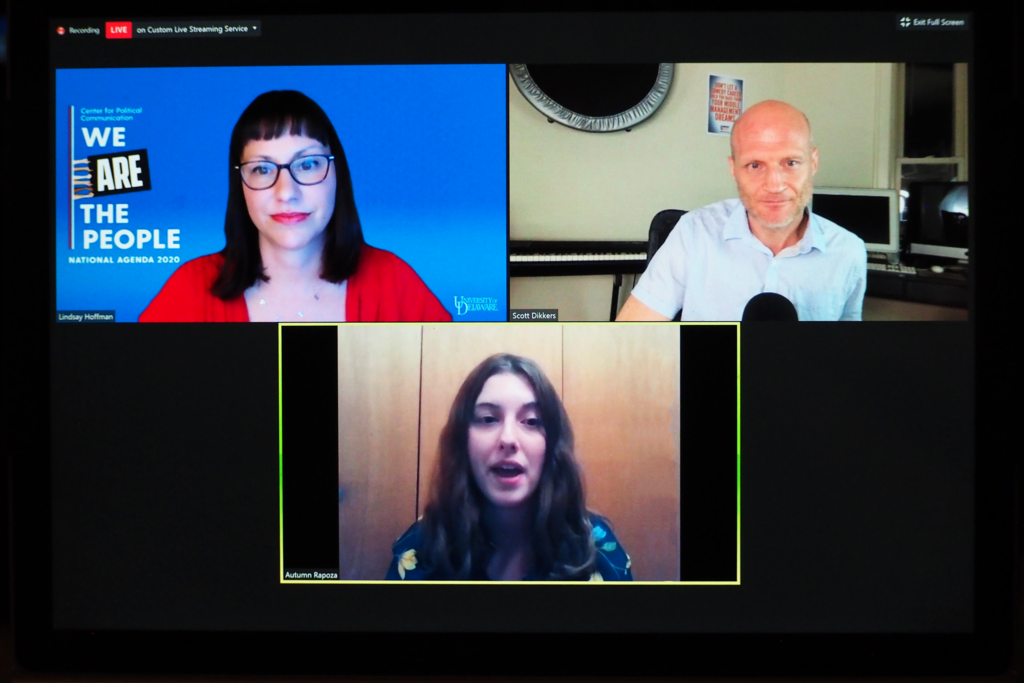Fake News Gets Real
Co-founder of The Onion talks fake news, politics, and satire
By Eleni Finkelstein, University of Delaware senior and intern for the University of Delaware’s Center for Political Communication
Watch the video. Read the transcript. To learn more about the National Agenda student experience, read “Keeping the Conversation Going” by CPC intern and National Agenda student Sean O’Connor.
“The world is crazier than anything a satirist could invent,” Scott Dikkers, the first guest speaker of the University of Delaware’s 10th annual National Agenda speaker series, said on September 16. Hosted by the Center for Political Communication, the now entirely virtual program drew more than 400 viewers from 19 states and 4 countries including UD students, alumni, and the UD community. Dikkers, the co-founder of the satirical news site The Onion, discussed satire versus fake news, how to succeed in comedy, and how politics intertwines with humor.
The Onion was founded in 1988 in Madison, Wisconsin, as a weekly satirical newspaper. When Dikkers bought The Onion a year later to run as a formal publishing company, he saw the potential for it to be marketed beyond Madison’s local audience. In 1996, Dikkers and his business partner Peter Haise adapted The Onion as the world’s first humor website, knowing they could reach a much wider audience on the Internet. Now, The Onion‘s humorous headlines reach audiences around the world through their website, social media, and of course, your distant relative’s Facebook post that unironically shares the satirical article as a truthful news story.

National Agenda Director Lindsay Hoffman, Ph.D., welcomed the speaker and the audience to the 10th annual speaker series, and asked Dikkers about the difference between satire and the Internet’s favorite term, “fake news.” Dikkers clarified why the two often get mixed up. “It’s an accident of history,” he said. “A whole generation grew up only seeing satire in news parodies? as opposed to other genres of satirical content. He pointed out that satire has actually been around for centuries in the form of Greek plays, novels, movies, and so on.
So what is the difference between fake news and satire? According to Dikkers, satire is intended to humorously communicate the subtextual message of what is wrong with the world. Fake news, on the other hand, is used as a form of propaganda to shape the narrative of an event to favor one side. As both preponderated in current events and politics, the public began to confuse the two. This phenomenon has led to consequences when The Onion‘s headlines are misinterpreted as fake news, or even, as they often are, as real news.
“I believe it’s the audience’s responsibility to deal with their feelings. It’s not my problem,” Dikkers bluntly stated regarding the common misinterpretation of The Onion as real news. “It is my problem if the humor I created seems real,” he clarified. If the typical Internet user responds poorly after coming across an article, Dikkers sees the joke as a failure. In Dikkers’s opinion, “It’s not funny enough if people get angry.” Yet he argued that the failure to understand The Onion as a satirical medium falls on the readers? shoulders. A simple fact-check or visit to the website’s “about page” reveals the true intentions of the publication.
In today’s world, however, The Onion‘s outrageous headlines seem more and more realistic. Dikkers answered an audience question during the live event: Had he seen any real news headlines lately that seemed like they were straight from The Onion? His answer was an unwavering “yes.” Dikkers explained that many current news stories about the Trump administration mirror parodies The Onion produced years ago. A satirical article in Dikkers’s 2015 book, Trump’s America: Buy This Book and Mexico Will Pay for It, reported that President Trump had launched an anti presidential-discrimination league. Dikkers reflected on the irony that President Trump now expresses concerns about presidential discrimination. “Who would have thought that the President could turn himself into a victim of discrimination?” said Dikkers. “So many things we write in The Onion have come true. And even crazier than that, people believe they”re real before they become true.”
Dikkers, who also teaches and writes books about comedy, provided some advice for aspiring comedians on how to be funny: “Do something original that you don’t see anyone doing, that’s what breaks through.” Dikkers? advice stems from The Onion being the first to combine satire with current events, which is why it broke through the competition.
The National Agenda Speaker Series will continue virtually throughout the semester with guests such as Homeland co-creator Howard Gordon, co-host of NPR’s All Things Considered Mary Louise Kelly, correspondent of GQ Magazine Julia Ioffe, and more. For information and to register, visit cpc.udel.edu/nationalagenda.
About National Agenda
The 2020 edition of the University of Delaware’s National Agenda program, “We Are the People,” calls attention to the power of us”the citizens of the United States”as well as the liberties granted to us by the Constitution. Even in this tumultuous time, our right to vote in elections remains one of the most important acts we can perform as Americans. The 10th annual National Agenda speaker series tackles the issues facing the nation, with insight from a humorist, Hollywood producers, political insiders, and national journalists. In light of COVID-19 restrictions, National Agenda 2020 is presented as a series of webinars on Zoom. It is a free online series and open to the public. Lindsay Hoffman, Ph.D., UD associate professor of communication and political science, directs the program. It is made possible with support from the Office of the Provost and the College of Arts and Sciences. Learn more at cpc.udel.edu/nationalagenda.
